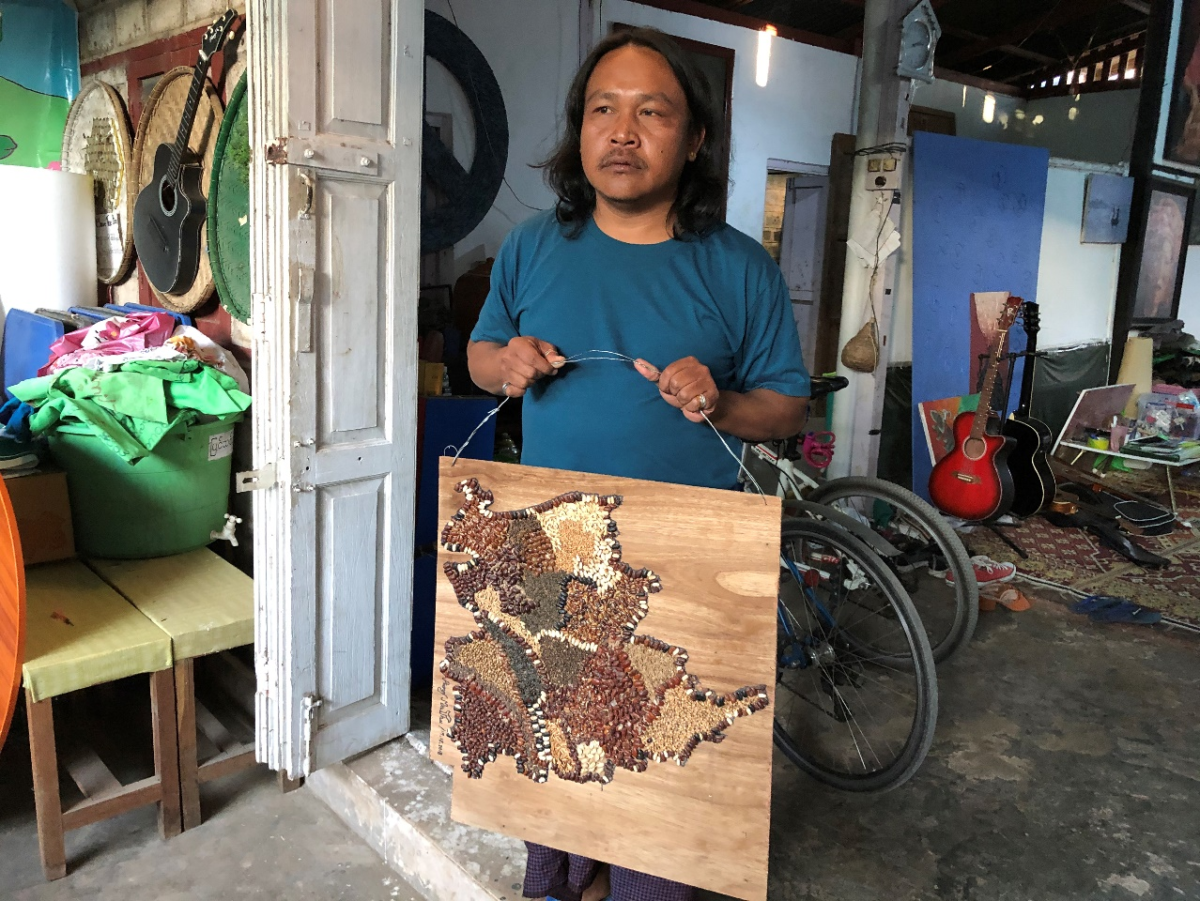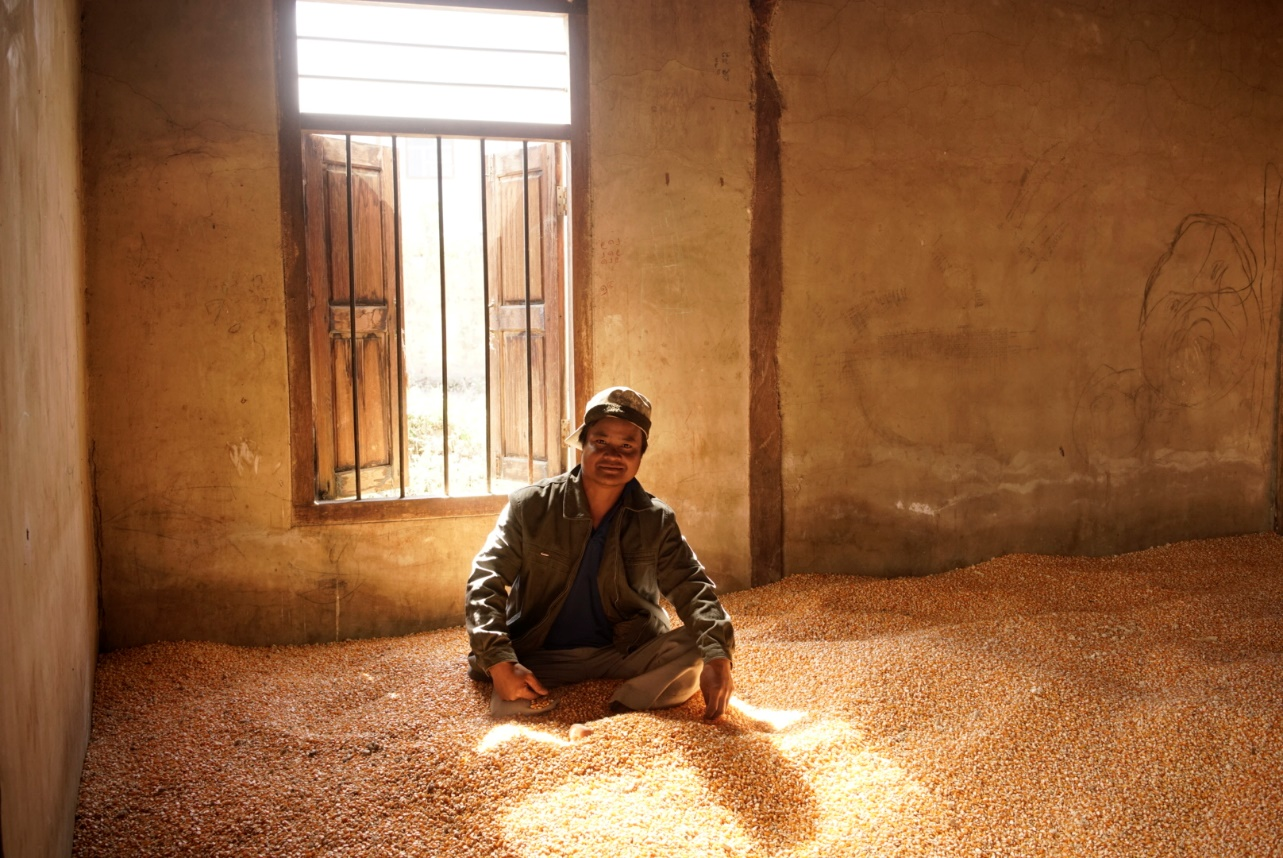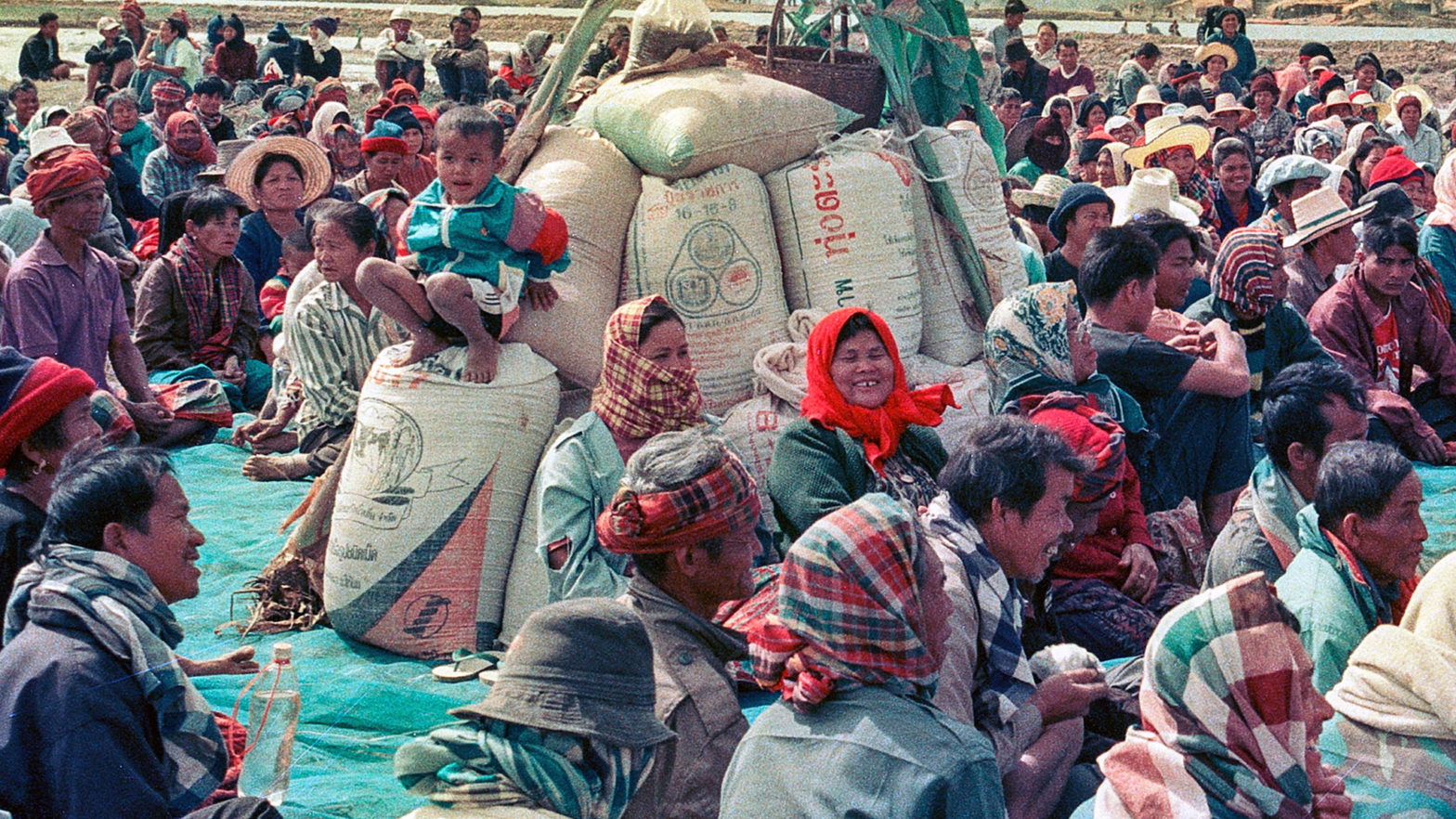This is the third story in a three-part Mekong Eye feature report exploring how contract farming in Myanmar’s Shan State is leaving poor farmers buried in debt and people in neighboring countries choking under smog. (part 1) (part 2)
Inside his small gallery in Taunggyi, the biggest city in Myanmar’s Shan State, prominent local artist and eco activist Eait Htoo proudly shows us his creative commitment to the environment – a map of Shan State made from multicoloured seeds and grains.
Though modest in comparison to his other creations, he said this piece is special since the seeds are native to the area and testify to the state’s rich agrobiodiversity.
“We used to grow different food crops before the arrival of contract farming. Every community grew its own unique blend of crops like rice, millet and soybean, using methods passed down for generations,” said Eait Htoo, who also coordinates the local artist collective, Our Lovely World.
“This is now history. Over the past decade, more than 80 percent of local seeds in Shan State have disappeared and have been replaced by monoculture maize farming. More and more farmers are abandoning traditional polyculture farming for contract farming with the hope of making more money.”
The loss of local seeds is a matter of great concern, he warns, because it means farmers will not be able to resume traditional farming practices and instead have to rely on growing genetically modified hybrid maize for transnational agribusiness investors. And this potentially irreversible shift is having grave consequences.
“Not only is monoculture maize farming taking a heavy toll on the environment through seasonal transboundary haze [from field burning] and contamination from farm chemicals, it is also having significant impact on local communities by saddling smallholder farmers with heavy debt due to high production costs and the unstable market price,” Eait Htoo said.
“The farmers are losing their sovereignty over food production, which is jeopardising their livelihood and leaving them vulnerable to social problems such land dispossession and human trafficking. It is like we are being colonised by transnational food conglomerates.”
Thailand’s CP Group, the agribusiness giant behind most contract maize farming in Shan State, says sustainability is a core value of its business operation. CPP Myanmar, a subsidiary of CP Group, is the biggest player in Myanmar’s maize seed market.
Responding to criticism of big agribusiness investment in maize farming in Shan State, Worasit Sittivichai, executive vice president of CPP Myanmar, said the company practises good governance and works closely with Myanmar authorities and local farmers to promote development goals that benefit every stakeholder.
“As one of the first foreign investors and a pioneer in Myanmar’s maize industry, we cherish the principle that our business and local people must grow together,” Worasit said.
“Before we brought our maize seed and animal-feed business to Myanmar 20 years ago, local farmers were already growing maize but on a very small scale. When we introduced CP hybrid maize breeds, which yielded much larger and higher quality crops, farmers’ incomes and livelihoods improved.”
However, extreme weather patterns in the region had impacted sustainability and climate resilience in maize and animal-feed production supply chains, meaning the company had to constantly improve its hybrid maize strains so crops could withstand new diseases and changing climate, he said.
“Hence, growing hybrid maize breeds can be a solution for local Shan farmers to ensure food security and sustainability,” he added.
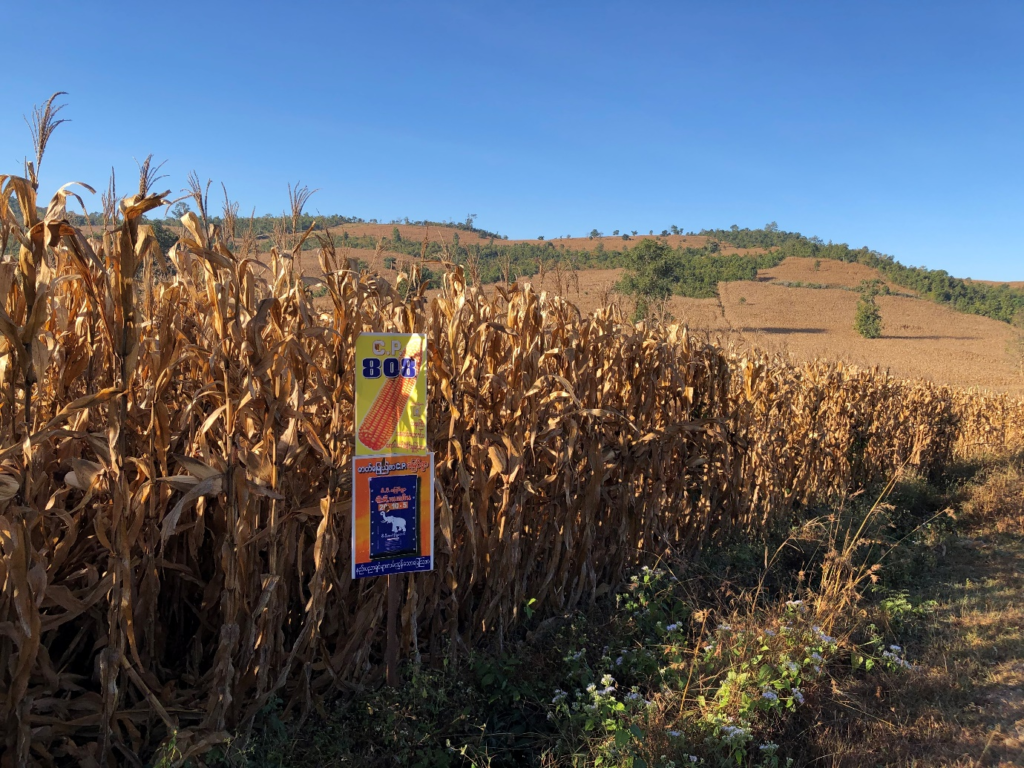
An agribusiness advertisement for hybrid maize seeds is posted alongside a maize plantation in Shan State. Photo by: Pratch Rujivanarom
Climate crisis: Big storm on the horizon
Myanmar is already feeling the impact of climate change, and studies show that the worst affected will be farming communities.
According to the latest brief on Myanmar by the United Nations Food and Agriculture Organisation, released in September, the late arrival of this year’s rainy season and lower than average rainfall delayed the rice and maize planting season in most parts of the country, including Shan State.
While this year’s unusual weather had a limited impact on overall rice and maize production, it demonstrated how vulnerable Myanmar’s agricultural sector is to irregular seasons and rainfall patterns, given that 80 percent of its agricultural land is rainfed rather than irrigated.
In Shan State, the impact of climate change on local farming communities is quickly becoming clear. The evidence comes from studies such as “Nurturing Resilience in Smallholder Farming Systems: Emerging Insights from a Climate-Smart Village in Southern Shan State, Myanmar”, which was published in June. It shows that the weather in Thaungkamau village in Nyaungshwe Township has become significantly hotter and drier in recent years.
Co-author Wilson John Barbon, Myanmar country director for the International Institute of Rural Reconstruction, said the changing climate in Shan State is taking a grave toll on local agriculture, wrecking crops and eroding soil fertility.
“Last year many farmers suffered extensive damages from crop failure due to unusually high rainfall. This year, we hope the rainy season will be better, but irregular weather patterns are more likely in the future,” he said.
“Small-holder farmers in the monoculture agriculture system will be the most vulnerable group to extreme weather, because a sudden rain shortage, intensive downpour or disease outbreak can destroy their crop in an instant, leaving the farmers with huge losses in income and leading to food insecurity.”
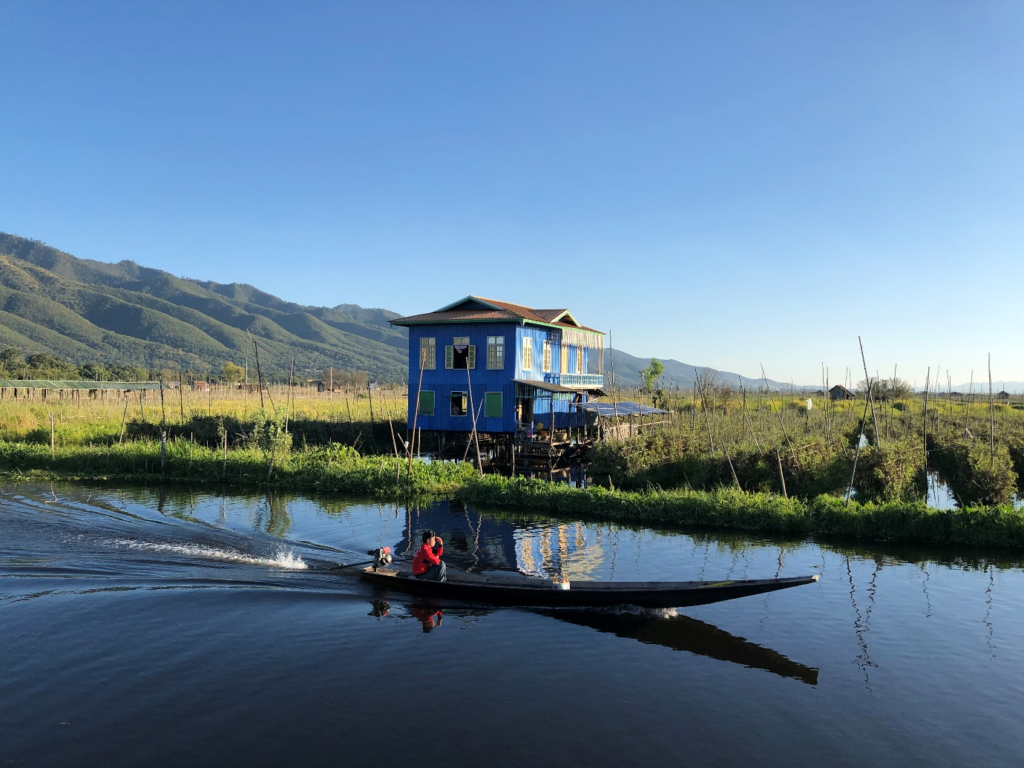
Floating plantations over Inle Lake in one of the few diversified farming areas that can still be seen in Shan State. Photo by: Pratch Rujivanarom
Diversified farming the right path to climate resilience
Local communities threatened by the climate crisis and food insecurity can learn from the success story of Thaungkamau village, said Barbon. Thaungkamau was turned into a “climate-smart” village, where locals now practice diversified farming to minimise the impact of changing weather patterns.
The Climate-Smart Villages project is a collaboration between the IIRR and several agencies, including the International Development Research Centre (IDRC), the CGIAR Research Programme on Climate Change and Agriculture and Food Security (CCAFS), as well as local NGO and state partners.
The project studies how climate change is affecting farming communities in four locations across Myanmar, in order to develop defence strategies against extreme weather patterns. The project works with farmers to test Climate-Smart Agriculture (CSA) technologies and find out what works.
The four Climate-Smart Villages are Ma Sein in Ayeyarwaddy Region, Htee Pu in Nyaung-Oo’s dry zone, Thaungkamau in the Shan uplands, and Saktha in the hills of Chin State.
“We learned from the project in Thaungkamau village that diversified farming is key to strengthening climate resilience and adaptation in the agricultural sector,” said Barbon.
“In the Thaungkamau climate-smart village, we are encouraging smallholder farmers to grow different kinds of plants such as rice, maize, legumes, soybeans, vegetables and fruit trees, which provide different sources of income for farmers, while also allowing them to grow and consume their own food that is cheaper and better for food security.”
Diversified agriculture was found to help local farmers minimise climate change impacts, he explained, as it reduces the risk of crop failure and also restores and sustains a healthy ecosystem, including soil fertility, while lessening the intensity of natural disasters.
He added that the COVID-19 crisis has exposed the vulnerability of food systems in many poor communities, as lockdowns and border closures to halt the spread of the virus have also disrupted the movement of food.
“The COVID-19 pandemic tells us that in order to be food-secure, we need to empower local villages and farming households to produce their own food in addition to producing crops for income, as well as encouraging local farmers to value their own local varieties and agrobiodiversity before they are lost completely,” he said.
“We hope the good examples we have seen at Thaungkamau village will inspire others to learn from these successes and adapt our approaches and practices to push their own community toward sustainability and climate resilience.”
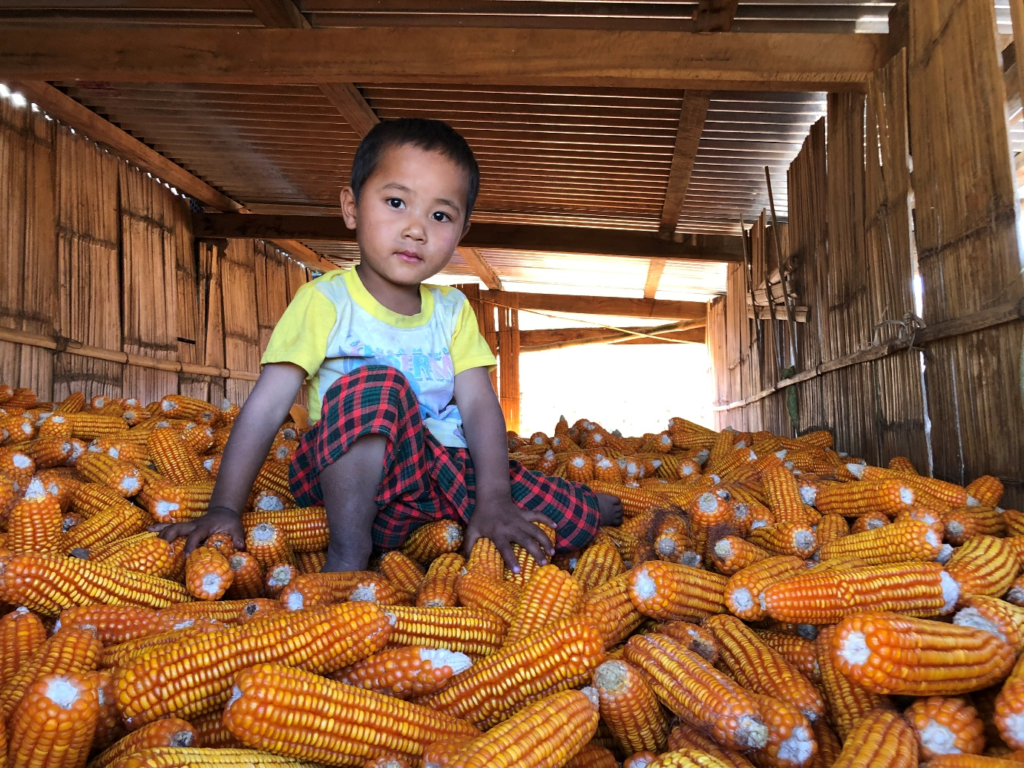
The future of the new generation in Shan State is under threat from unsustainable agricultural practices and impacts of climate change. Photo by: Pratch Rujivanarom
How to seed sustainability
Alongside the benefits of diversified agriculture seen in Thaungkamau village, Shan environmental activist Eait Htoo insists that building a local seed bank is equally important to securing sustainability amid the climate crisis.
Pointing to hotter and more volatile weather in Shan State over recent years, he warned that the disappearance of local agrobiodiversity is a creeping threat that is undermining communities’ capacity to cope with challenges from climate change.
“Not only are native crop varieties naturally more resistant to diseases and weather conditions than big food companies’ genetically-modified hybrid breeds, the farmers can also improve these native varieties to better adapt to shifting climate patterns and extreme weather, unlike the patented commercial maize varieties,” he said.
“Hence, conserving local seed stocks is a way to make local farming communities more resilient to the changing climate and a path to attaining food security and a sustainable future for communities.”
However, he said few farmers are aware of the benefits of conserving agrobiodiversity. Meanwhile Shan State’s natural resources continue to disappear, while relevant government agencies and maize investors largely ignore the problem.
“Industrial maize investment does not benefit the people of Shan State. It only benefits the transnational conglomerates at the cost of our environment, our resources and our livelihoods,” Eait Htoo said.
The reporting for this feature series was made possible though funding provided by Earth Journalism Network.


